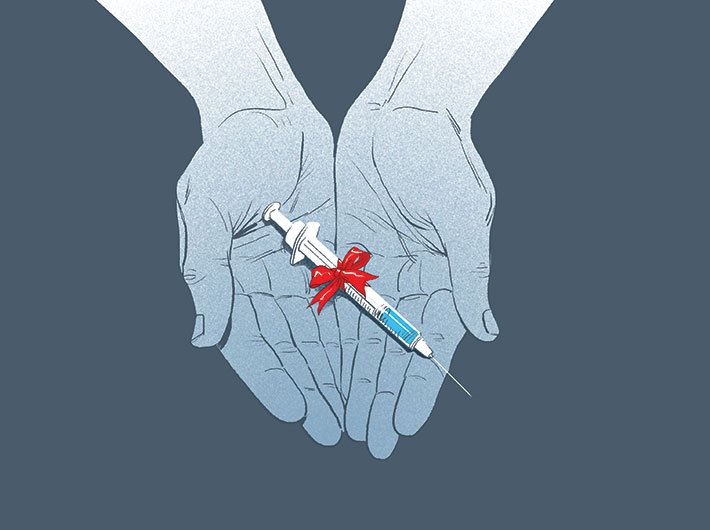Inherent in the idea of human dignity is the right to choose a dignified death. The ‘living will’ judgment makes that possible
Death is an inevitable consequence of birth and evokes as much a sense of mystery as it inspires awe and fear. In the Kathopanishad, Nachiketa considers knowledge of death and the beyond as the only truth. The idea of invoking death by choice, or ichchhamaran, is unique to the Indian ethos. But it has taken decades of struggle to legalise the idea of a ‘living will’ (which sets out a person’s will that he or she be allowed to die under certain conditions). Medicine is no longer about administering placebos. A recent judgment of the supreme court of India on passive euthanasia and living wills has brought partial closure to the long campaign of the Society for the Right to Die with Dignity, an organisation started by Minoo Masani in the 1960s.
Active medical and surgical intervention, backed by technological innovation, can not only cure illness but also prolong life.
Hooked to expensive ventilators, dialysis machines and other supportive systems, a patient can be made to live for much longer than the normal life expectancy for someone with their complications. The cost of artificially prolonging life can be both emotionally and financially prohibitive while outcomes are not always positive. Human finitude, the indignity of pain, and a sense of a lack of self make the situation a living hell. The futility of treatment often gets overlooked. There is also much emotional pressure from beloved ones and others. What the five-judge constitution bench of the supreme court has pronounced, after hearing a petition from the Society for the Right to Die with Dignity and Common Cause, both rights groups, is to legalise passive euthanasia and ‘living wills’, laying down caveats and strict guidelines.
Individual autonomy is at the core of modern, non-paternalistic medical practice. Every individual has the right to refuse any treatment. Administration of treatment without informed consent amounts to battery. This autonomy is as relevant when an individual is not aware of the self (or unconscious) as when he is fully aware and in his senses. Currently, the power of attorney is usurped by surrogates without any explicit consent.
Legalising a living will changes it all. The living will is a document executed by a competent person of sound mind, on his/her own volition and under no coercion, about the health care decisions to be followed in the event of the person becoming incompetent to make such decisions or give consent for such treatment. This may include detailed instructions regarding therapeutic decisions or may be in the nature of designating a power of attorney to a surrogate who understands the needs and aspirations of the individual. The individual is free to revoke the living will at any time. Unlike a suicide note, it lists dos and don’ts –guidelines to be followed so that life is not needlessly prolonged.
A detailed living will without much ambiguity assists the treating physician to take appropriate decisions. The living will may instruct a physician not to resuscitate if the heart has stopped functioning for a period which might cause brain damage; if the patient is afflicted with an irreversible or irrevertible disease process; or if he or she is downed by a neuro-cognitive or other condition leading to a vegetative existence. In such conditions, the endeavour to maintain life at any cost is demeaning, bereft of dignity, and comes with a huge economic burden. It is a good practice for physicians to be empathetic and respect the living will. The logic and the idea of living will itself needs to permeate the health care system. The fear of abuse is overblown. The current system of surrogate deciding the fate of a helpless individual will continue till the living will becomes a popular idea.
Euthanasia literally means good death. Interpreted differently, it is life of dignity and without pain till death. Euthanasia has to be voluntary, be it active or passive. The supreme court has now approved passive euthanasia. Active euthanasia is an act of commission like overdosing of sedatives with an explicit intention to end life whereas passive euthanasia results from omission, like withdrawal of life sustaining devices or treatment. The proponents of active euthanasia think it immoral to prolong the agony when it is possible to end the same. However, those who endorse passive euthanasia think that not saving a life, particularly when it cannot be saved, is morally and legally permissive.
Euthanasia is further grouped into involuntary euthanasia and non-voluntary euthanasia. Involuntary euthanasia refers to a situation in which the person has the capacity to consent but has not provided one and non-voluntary euthanasia is a situation in which person is unable to provide a consent for reasons such as dementia or coma. Involuntary euthanasia should be avoided at all costs so that one doesn’t take the slippery slope. Non-voluntary euthanasia or passive euthanasia in the absence of living will must to be performed according to the guidelines prescribed by the supreme court.
The ruling may not change the prevailing practice, where de-escalation of treatment or DNR (‘do not resuscitate’ order) is followed on the instructions of the family. It will definitely have an impact on non-voluntary euthanasia. The decision is significant for an entirely different reason. The supreme court says, “The right to privacy protects autonomy in making decisions related to the intimate domain of death as well as bodily integrity”!
In these turbulent times, it is the secular (non-religious) undertone of the decision that calls for a big applause.
Dr Huilgol, the chief radiation oncologist at Dr Balabhai Nanavati Hospital, Mumbai, is president of the Society for the Right to Die with Dignity.
(The column appears in the April 15, 2018 issue)
